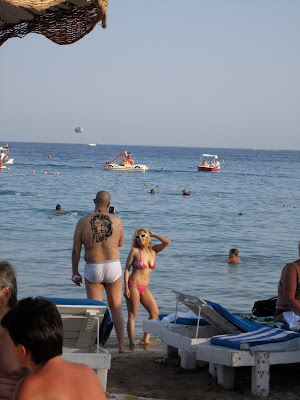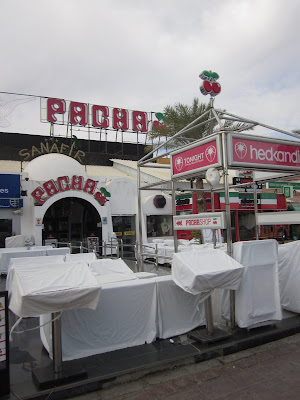
Finally, finals are over and I have finished moving into Nora's apartment, so I have time to write a real post despite the incessant meowing/screeching (think of a noise that is a mix between Gollum's coughing and a baby being strangled) of the resident cat in heat that I am sharing the apartment with. As I was finishing up my finals last week, one of my classmates mentioned that she and two of our mutual friends were going South to explore some of Egypt's most famous ruins, Abu Simbel, outside the multi-millenia old city of Aswan. Despite not being much of a ruin-y kind of guy, I have been meaning to go there for a while now as they are supposed to be pretty mind-blowingly cool, so I decided sort of last minute to go with them. Aswan is almost 900km south of Cairo, so my friends were flying, while I, wanting to go the cheap route, decided to take a train, which ended up being about 1/4 as expensive, so I felt justified.
Getting my ticket turned out to be quite the adventure in and of itself as the train station is still under heavy construction on the inside. I can't quite explain the turmoil that is the inside of Ramses train station, but it's not even really an exaggeration to say it looks like a recent warzone. Copious dust and the sounds of heavy machinery inundate the air completely, all of which made it hard to ask where the ticket offices had been relocated to. After asking two Egyptians, I was having no luck, so when a random Egyptian man came and asked where I was trying to go, I told him even though in Egypt this is usually a recipe for being taken to the wrong place and asked for money. In what ought to be a lesson to me, this man and his friend ended up being some of the nicest two Egyptians I have ever met.

Ramses Station, with the outside newly refinished, but with an inside still under heavy--and confusing--construction.
Despite numerous obstacles and annoyances, they eventually took me to the right office. This involved going underground into tunnels, asking more Egyptians for directions, and talking to a total of 4 different counters. Throughout it all he and his friend cheerfully accompanied me through each setback and then talked to the ticket sellers.* At first my pride was getting a little pouty as I am now capable of talking to ticket sellers very much on my own, but as complications inevitably arose, it was nice to have an Egyptian there. Complications like the sleeper car tickets were unavailable, first class was sold out, and--oh--the Egyptian government unofficially doesn't allow foreigners to buy second class tickets for the Cairo-Aswan train route. They just...don't. Luckily, my Egyptian friends were kind enough to buy the ticket on my behalf, so I was not only able to leave at the time I wanted, but I only had to pay LE55 ($10). To top it off, my new friends wouldn't even ask for money, and then insisted, and I mean
insisted, that they buy me a soda. "Are you thirsty? You
must be thirsty! Do you want a bebsee? You must
want a bebsee!" (bebsee=Egyptian pronunciation of Pepsi). All in all, it was a very positive experience, especially as I was able to have a decent Arabic conversation with him the whole time.
*You may be asking yourself why there are 4 different counters in different locations which are all so separated from the counters I had first found that I couldn't find them. You might be further confused in the light of the fact that all of these trains mentioned are run by a single organization: the Egyptian Government. Why not have all the ticket counters selling tickets for any state-run train, you ask? There is only one answer that my friends and I come back to time and time again: this is Egypt.
A few days later I got on my train at 10 pm settled in for a 13 hour ride. Riding in second class, as I'd found on the train to Alexandria, is more than comfortable enough. The seats lean way back and there is plenty of legroom. The only real drawbacks were in trying to sleep. It is loud, for one thing. So many ring tones--and all through the night. I remember deciding rather irritably at one point in the night around 5am, that selling Egyptians phones with the ability to play music out loud on their tinny, fuzzy speakers ought to be banned, because they did that.all.night.long. And if they weren't listening to their music without headphones, they were taking phone calls at 3, 4, 5 am. Two girls with shimmery, sequined black hijabs sitting a few rows ahead of me, in fact, played their phones the entire night. Some shabab (arabic word that literally means young men or young people, but is most often used to convey something like ruffians) in the seats behind me alternately joked, clapped, sang, and whistled all through the night as well. The seat next to me rotated between a few men, but all of them snored at various degrees of loudness. I'm a pretty adept sleeper, as most of you know, so it was far from unbearable; I just remember waking up a few times and really wanting to break some Egyptians' phones.
The ride was further ameliorated by one of the coolest sunrises I have ever seen. The Cairo-Aswan line sticks to the Nile valley so I woke to the sun's first light silhouetting countless palm trees against the foggy river-fed plantations. The mist sat low to the ground, sometimes obscuring the trunks of the trees so that the palm leaves looked like shadowy explosions penciled onto the bright colors of the sunrise.

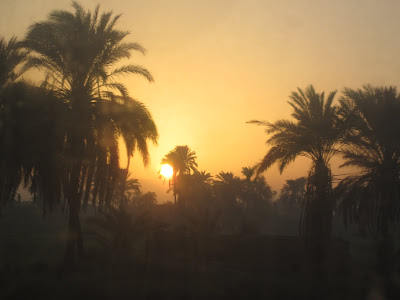
As I tried to take pictures through the horribly dirty windows, the guy in the chair next to me stirred and awoke. One of the countless food salesmen walking up and down the aisles of the second class cars had apparently caught his attention. Among the sellers, there were tea/nescafe sellers carrying their glasses on metal trays, cold drink salesmen selling from carts, as well as one selling "hommos," which here in the Middle East means any number of variations on some ingestible thing made with chickpeas. I had a bought a particularly delicious cheese and bread sandwich from one of the tea/nescafe guys and I had just finished it when my neighbor flagged down one of the food guys carrying a big wicker basket on his shoulder with pieces of paper sticking up and hiding what was inside. Like all the salesmen, he was yelling out something about what he had, but the only word I could understand was the word for "sweet."
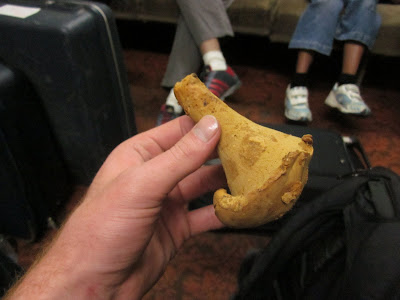
I watched as my neighbor purchased one of the strange snacks inside which got wrapped in one of the papers that had been sticking up in the basket. I thought at first they were very strange sweet potatoes as they were the same light brown color, but they were all identically shaped cones, like the ends of those Vuvuzela horns from the world cup. After a second, my neighbor broke the thing in half and offered a half to me to reveal it to be a tightly packed, powdery, crumbly...thing. It had the consistency of bread crumbs and brown sugar, but it was much sweeter. Tasty, with a familiar taste that I couldn't quite place, but very sweet.
As I thanked the man, a little girl in a pink jumpsuit tapped my shoulder to get by me to my neighbor in the window seat. Her bright pink jumpsuit stood out against the man's dark green galabaya as she sat on his lap, but his tinted glasses and fancy watch hinted at some slightly less traditional Egyptian tastes to the man. He was pretty adorable with the girl, who I assumed was his granddaughter, as she pointed and marvelled at all the things she saw through the window. We talked a little in Arabic, but he had an accent--whether from his age or from being a southern Egyptian, I couldn't tell--that I couldn't totally understand. I stern looking man in a leather jacket sitting in the front of us turned around and first asked me where I was from and what I was doing in Egypt. Then he asked me in English "What are your qualifications?" and acted both confused and annoyed when I wasn't sure what that even meant. That was the end of my conversation with him, but my grandfatherly neighbor had left me in a pleasant mood. He got off at the next stop and I dozed pleasantly for the remaining three hours of the train ride.

After getting off the train, I had a couple of hours to kill before the friends I was meeting there in Aswan would be in the city, so I headed to the nearest koshary place--what else? The place had come recommended in the copy of Lonely Planet I stole from Nora, and while it wasn't the best koshary I've ever had, I apparently managed to speak enough Arabic with them that after I finished eating it, they informed me that the meal was on them! Boo ya free koshary! After that I headed over to the Market Street which is literally a big long street that runs parallel to the Nile and through most of the city. Lining the cobble-stone walkway on either side was shop after shop selling, for the most part, the standard Egyptian kitsch (scarves, things shaped like pyramids or camels, spices), but there were plenty of Egyptians walking along the path buying various other day-to-day goods as well.

The shopkeeps heckled and hassled every foreigner walking by in much the same aggressive style as the ones in Khan do, yet despite knowing better I ended up stopping at one such shop, compelled by the same inexplicable feeling that this guy would maybe be interesting to talk to as had
once stopped me in the Cairo clothing market. The shopkeep, named Gameel, offered me tea, which I accepted, and then after deciding to buy a t-shirt with some hieroglyphics on them for my dad, we sat and talked for a good hour or so about his thoughts about Egypt and such

. He spoke mostly in Arabic, and I spoke exclusively in Arabic, which alone would have made me really happy with the conversation, but it was even cooler because of the interesting things he had to say. The highlight was that he actually liked Mubarak, the thirty-something-year President of Egypt who looks likely to arrange for his son to be the next President. I've literally not met a single other Egyptian who likes Mubarak, but he seemed to think Mubarak was widely liked there in Aswan, so it made me wonder how skewed an image of Egyptian politics I'm getting living in Cairo.
After my little discussion with Gameel, we parted ways, and I met up with my AUC friends, Sanya (from my Fusha classes) and Rhianna. We had lunch at a Nile-side restaurant with mediocre Tagin (kind of like a stew) and then decided to try and figure out a way to visit some of the famous islands just across from Aswan.

It was about 5pm when we started out, and we decided to take a felucca ride with a nice-seeming man named Nasser. Like the Koshary guys, he seemed particularly impressed with my Arabic* and we were having a nice conversation which at first served to console me for a while until I realized his sail boat was going very very slowly. Our promised one-hour felucca ride turned into a three-hour ride, and involved me and Sanya both (Rhianna slept through all of this) steering at various points in our ill-fated voyage as well as me having to row for a stretch because our captain wasn't able to generate enough power by himself on both oars. This was a frustrating boat ride, to say the least, especially because I had suggested that we would probably prefer no to go the way he wanted as we were in a hurry. On top of it all, our driver insisted on giving me his phone number and address for the purpose of referring anyone else I knew coming to Aswan. He lived on one of the islands we were ever-so-slowly sailing by and I had to laugh at his simple address:
Nasser Ahmad
Elaphantine Island
Aswan, Egypt
No street and no street number, he's just the only one on the island with that name. Needless to say, I do not recommend him. It was mostly too dark to see anything on the islands anyway!
*Let me say for the record, I am really not that good at Arabic yet, though I'm getting there. When I get these kinds of compliments on my Arabic, it is more a reflection of the dearth of Arabic-speakers from America and Europe. Many Egyptians really just don't expect Westerners to speak anything more than the absolute most basic Arabic, and often times they don't even expect us to know that much. I do perhaps do a slightly better job using Ammeya instead of Fusha which maybe gets me some extra points with them as they know we're all mostly just learning Fusha.
After our boat ride we grabbed some fiteer for dinner and then headed to a cafe to have some tea and smoke some sheesha just like your everyday Egyptian. We just picked one of the closest cafes to our dinner restaurant on the Market Street and sat back and relaxed for a good two hours. It would have been a great end to our night, if not for the cafe's proprietor wanting to charge us for LE60 for two sheeshas and three cups of tea. That is only $11 dollars, but that is about five times as expensive as it should be at most cafes. He was definitely giving us the tourist price--I know because a regular Egyptian sitting at the cafe also asked the proprietor how much he was asking for--and after our irritating boat ride, I was not having it. I unleashed as much indignation as I could in Arabic and ultimately got the price cut in half, though that was still really twice as expensive as it should be.
After the cafe I said goodbye to Sanya and Rhianna as they had to catch their plane back to Cairo that night, and I set off to find myself a hotel. I picked the cheapest one recommended in Lonely Planet and was in my room by about midnight. As I checked in, I also arranged to go on one of the hotel-organized trips to see Abu Simbel the next day. I knew that would entail having to take a bus at 3:00am, but as these are some of the most famous ruins in all of Egypt, I knew I had to go and see them myself. To my annoyance, the hotel assistant woke me up at 2:30, apparently not trusting me to wake up to my own alarm, which was set for 15 minutes later. I managed to get one of the only seats in our mini bus with leg room and so I slept through most of the four-hour trip down south to the sites of the ruins, despite our driver periodically carrying on a shouted conversation with the other Egyptian man on our bus who turned out to be our "guide." This guy continued to be annoying as he actually shared little more information about the site than I had learned in the guidebook and then demanded that we "tip" him at the end. The rest of the group I had come with were all tourists just travelling through Egypt for a week or so, but even they sensed this was a little weird, and so began what would be kind of an uncomfortable relationship with our guide which led us all to literally avoid him at the second site.

Squinting into the Sun in front of Ramses' Temple
Nonetheless,

the ruins at Abu Simbel, two giant temples in honor of semi-divine Pharaoh Rameses II and his famous, also pseudo-god-like wife Neferari, were indeed pretty magnificent. This even with literally hundreds of other tourists all there at the same time and prohibition on taking pictures inside the temples. I ignored both (see picture to the right). I'll let the pictures speak for themselves, but one other interesting piece of information is that these temples were actually not originally located in this spot. They, along with many other spectacular Ancient Egyptian sites, were painstakingly relocated at the expense of both the Egyptian government as well as many other countries' to avoid being submerged by Lake Nasser--a humongous reservoir (one of the world's biggest) created as a result of Egypt's massive Aswan High Dam.
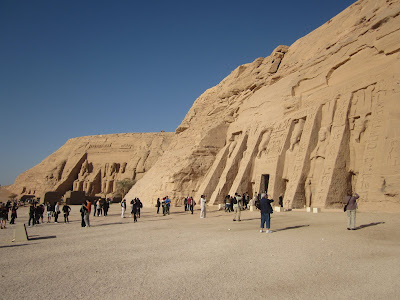
Nefertari's Temple with her husbands' in the background.
After

Abu Simbel we headed almost all the way back to Aswan to go to the island ruins of Phillae. Phillae is actually a collection of various temples to various Egyptian and Greek gods alike, and all of these were moved from a different island now under the waters of Lake Nasser. My capacity for ruins-appreciation may have run out or Phillae just only had so much to offer, but either way, I was ready to go after about thirty minutes. The one thing I found most interesting was how many of the hieroglyphic pictures of humans had been defaced by various Christians and Muslims who had appropriated the temples centuries after their creation.


I keep bringing up how I'm not one who can really appreciate ancient monuments as much as many other people, but I did find myself thinking as I was bored and waiting for our boat to leave Phillae, that perhaps I am so nonplussed because in a lot of ways these ancient sites don't actually look very different from the recreations our technology has allowed us to produce in theme parks and restaurants and such.
After heading back into town, I grabbed some lunch with some of the other tourists and then bought my train ticket for that night. This time I wasn't able to get a super-cheap second-class ticket again, so I bought the first class one for three times as much, feeling like this trip had turned into quite the money pit.
With three hours to kill, I went and stocked up on train snacks. Then, with nothing else to do in Aswan, I resorted to the same thing Egyptians do all the time: I decided to go and sit at a cafe and do nothing, making sure this time that I picked one far from the touristy areas. I had brought a collection of Dostoevsky short stories I've been meaning to read for about a year now and read that for a bit, but I mostly just sat and enjoyed a sheesha and some tea just like the vast majority of Egyptian men do every day. I began to think to myself about just how much speaking Arabic is a commodity over here while I watched two other tourists get almost no service as they struggled to communicate with the servers. Knowing a little Arabic is worth less hassle here, a free koshary there, and lower prices when you bargain. Now someday it is hopefully worth some kind of real understanding of this place. Or at least a job...
On the train,
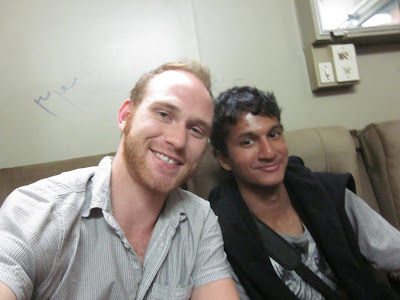
I met a fascinating Sri Lankan family of five who lived in Oman just finishing up their second Egyptian vacation. Don't entirely know what the father in the family does in Oman (something with computers, I think?), but he seemed to be providing for his family quite well as two of his children went to college in Australia. I ended up talking with the middle child, the son who was about to enter his first semester of school in Aussie-land, and he started talking to me about a lot of his worries about college, girls, his professional future, etc. and I tried to provide the best reassurance and advice that I could. He in turn taught me a good amount of things about Sri Lanka and Oman, both of which I am fairly ignorant about, and I shared with him a Galab (the cone thing from the train ride into Aswan) I had bought in the market just before my train. Maybe I just figured out someone I can stay with if I ever visit Oman! They got off after only about three hours and then I pretty much slept the rest of the trip back to Cairo, waking only to speak briefly with the Egyptian businessmen that took the Sri Lankan family's seats. I returned to Cairo feeling pretty tired and like Aswan had been kind of a continuous rip-off only made up for by the good amount of Arabic conversation I had gotten to have. Either way, I was ready to get back to some more normal exploits with my friends while they were still in Cairo. I don't know if I'll get to the other major site of ancient Egyptian wonders to the South, Luxor, but I am glad I brought myself to see Abu Simbel at least. Maybe someday I'll really come to appreciate these things, but in the mean time I still have lots of exploring of the sites in Cairo to do still...
...Which is what this next week will be for (and writing lots of blog posts). Here's a pic from al-Azhar Mosque (one of the most important Sunni schools in the world) during the Friday prayer last week. Pretty cool.

After the noon prayer in the courtyard:
And then finally, a mosque in Cairo with what appear to be Christmas lights on Christmas eve...Oh Cairo:

Happy Holidays everyone!






























